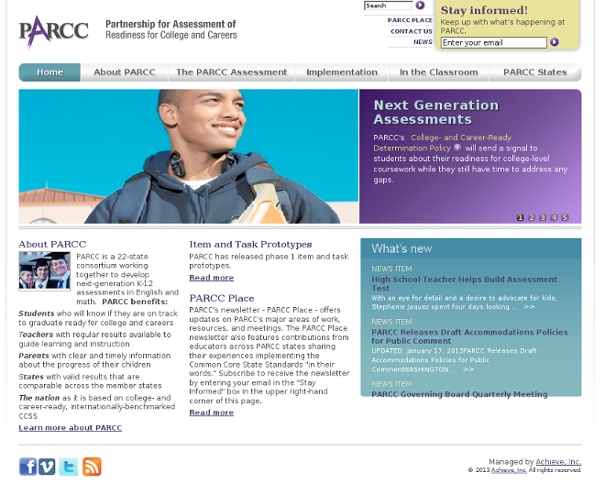



http://parcconline.org/partnership-assessment-readiness-college-and-careers
Related: common core mathMath Programs: How They Rate on Common-Core Alignment Based on market share and states’ recommendations, EdReports.org selected 20 math instructional series to review for common-core alignment. (For reporting purposes, K-5 and 6-8 texts from the same publisher were considered separate series.) Small teams of educators scored the digital and print texts on focus, coherence, rigor, and usability. In addition to individual grade-level ratings, EdReports.org gave summative ratings for each grade band (K-2, 3-5, and 6-8). Eureka Math was the only program that met the expectations for alignment to the Common Core State Standards at every grade level reviewed. Related: Most Math Curricula Found to Be Out of Sync With Common Core
North Carolina ACRE North Carolina's Accountability and Curriculum Reform Effort - also known as ACRE - is the state's comprehensive initiative to redefine the Standard Course of Study for K-12 students, the student assessment program and the school accountability model. In undertaking this ambitious work, North Carolina education leaders are the first in the nation to address learning standards, student assessments and school accountability simultaneously. In stages over five years (2008-2013) the ACRE initiative will
Common Core State Standards College and Career Readiness Illinois joined more than 40 states in a collaborative effort to raise learning standards and improve college and career readiness for all students, regardless of where they live. The new Common Core State Standards establish clear expectations for what students should learn in English language arts and mathematics at each grade level. The standards are high, clear, and uniform to ensure that students are prepared for success in college and the workforce.
Mathlanding Educator Review Learning Scores Engagement Is the product stimulating, entertaining, and engrossing? Will kids want to return? Beyond Working Hard: What Growth Mindset Teaches Us About Our Brains Growth mindset has become a pervasive theme in education discussions in part because of convincing research by Stanford professor Carol Dweck and others that relatively low-impact interventions on how a student thinks about himself as a learner can have big impacts on learning. The growth mindset research is part of a growing understanding and acknowledgement that many non-cognitive factors are important to academic learning. While it’s a positive sign that educators see value in the growth mindset research and believe they can implement it in their classrooms, the deceptively simple idea has led to some confusion and misperceptions about what a growth mindset really is and how teachers can support it in the classroom.
I Don’t Teach First Grade; I Teach Mathematics By Claire Riddell, posted July 5, 2016 — While teaching first grade, I sought out a partnership with a fifth-grade teacher to co-teach some math lessons in both of our classes. This partnership was not required by an administrator or a district initiative; instead it came from our mutual desire to understand mathematics and pedagogy before and after our respective grade levels. After experiencing just a few lessons in fifth grade, I realized that this partnership was opportunity to see into the future. I was able to experience what my students would be doing in mathematics in just four short years. I couldn’t believe how much of what they were learning in first grade connected to what they were expected to do in fifth grade.
NCSM - Overview When we move on, people do not remember us for what we do for ourselves. They remember us for what we do for them. They are the inheritors of our work. One of the great joys and grave responsibilities of leaders is making sure that those in their care live lives not only of success, but also of significance. How Much Freedom Should A Teacher Have? How Much Freedom Should A Teacher Have? by Grant Wiggins, Ed.D Ed note: On May 26, 2015, Grant Wiggins passed away. Grant was tremendously influential on TeachThought’s approach to education, and we were lucky enough for him to contribute his content to our site. Occasionally, we are going to go back and re-share his most memorable posts.
Mathematical Habits of Mind We all have them, some good and some bad. We pick them up from friends, family, and even strangers. But we may not recall who we picked them up from or when they began. Because we've practiced them over and over, these seemingly thoughtless repeated habits or behaviors, the pathways in our brain have become so broad, fast, and efficient in carrying them out that we do them automatically without even thinking. Yet these unconscious habits and behaviors add structure and order to our lives and help us to make sense of the world we live in. Our classrooms are full of them.